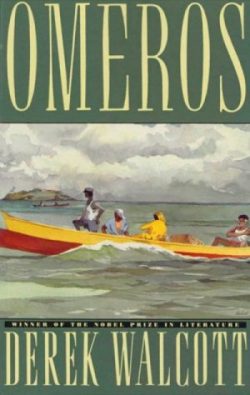A little more from Book I of Derek Walcott’s Omeros. I just love this description of the trees that thirst to become canoes and the way they almost are ships even before they are shaped. It’s so very joyful, so full of life, and the language just sings. And I always enjoy descriptions of how things are made, it reminds me of the descriptions in the Little House books of Pa making a cabin or bullets. And the satisfaction of those two names at the end of the section, Achilles and Hector. I notice that there, and only there, Achilles is spelled not in the French patois, but with the s at the end, like in the English translation of the epic.
I’ve resolved to read one chapter a day, they’re really short. Chapter 1 is just six pages of pretty widely-spaced verse. I think it took me five minutes to read it out loud. I read it once to Bella and then again to Sophie, who wasn’t in the room when I read it to Bella, and then again to myself for good measure. So my plan is read one chapter a day, but I can read that chapter as many times as I like, really let it sink in and not rush through it but enjoy the language and the playfulness of it. With sixty-four chapters, that should take me a little over two months.
. . . The men bound the big logs first
with new hemp and, like ants, trundled them to a cliff
to plunge through tall nettles. The logs gathered that thirstfor the sea which their own vined bodies were born with.
Now the trunks in eagerness to become canoes
ploughed into breakers of bushes, making raw holesof boulders, feeling not death inside them, but use–
to roof the sea, to be hulls. Then, on the beach, coals
were set in their hollows that were chipped with an adze.A flat-bed truck had carried their rope-bound bodies.
The charcoals, smouldering, cored the dugouts for days
till heat widened the wood enough for ribbed gunwales.Under his tapping chisel Achille felt their hollows
exhaling to touch the sea, lunging toward the haze
of bird-printed islets, the beaks of their parted bows.Then everything fit. The pirogues crouched on the sand
like hounds with sprigs in their teeth. The priest
sprinkled them with a bell, then he made the swift’s sign.When he smiled at Achille’s canoe, In God We Troust,
Achille said: “Leave it! Is God’ spelling and mine.”
After Mass one sunrise the canoes entered the troughsof the surpliced shallows, and their nodding prows
agreed with the waves to forget their lives as trees;
one would serve Hector and another, Achilles.







This is gorgeous! I’ve just been rereading Paddle-to-the-sea. There is something thrilling about boats made by hand of local wood and their ultimate destiny.
Love the lines “lunging toward the haze
of bird-printed islets”
I loved those lines too.
Paddle to the Sea is a favorite here. Boats are magical, I do think. Melville had it right about the fascination of boats and the sea.
This is delightful. I love the glimpses you’re sharing. And I love your notion of reading each bit a few times, to various kids and to yourself. What a gorgeous way to let the words sink in.
I was just sent a digital review copy of Heaney’s new translation of the Aeneid Book VI–did you know about this? I hadn’t read anything about it and then suddenly there it was!
And following up on my own comment — I just saw via Goodreads there’s a BBC radio show on which Ian McKellan read some of the Heaney Aeneid translation. No longer available at the link but might be track-downable. Sharing in case you’re interested… http://www.bbc.co.uk/programmes/b072j0mn
I had seen Heaney’s Aeneid translation pop up, I think maybe in Amazon’s suggested books? And I put it on my wishlist. Heaney! and Virgil! But so many books on that list. I will definitely hunt down that Ian McKellan reading if I can. Maybe this is the moment for Aeneid after all.